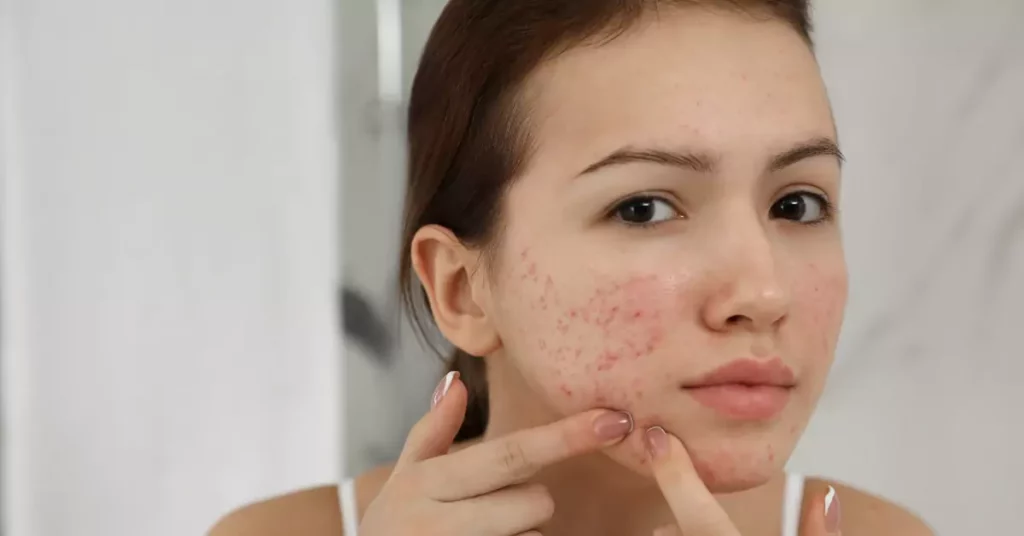Living With PCOS: A Personal Journey
Living with PCOS is a journey filled with both physical and emotional challenges.
As someone who has walked this path, I want to share my experiences and insights, hoping they resonate with those facing similar struggles.
Polycystic Ovary Syndrome (PCOS) is more than just a medical condition; it’s a complex web of symptoms that affect various aspects of our lives.
In this article, I will share some of the PCOS symptoms that I have noticed and how they have impacted my life.
I hope this article helps you address the signs and symptoms of PCOS and help you navigate through a life with Polycystic Ovary Syndrome.
Gained quite a few pounds
The battle with weight gain, particularly around the stomach area, is a constant companion for many of us with PCOS.
Shedding those extra pounds seems like an uphill task despite rigorous diets and exercise routines.
It’s important to understand that PCOS can make weight management challenging due to Insulin resistance.
Acne all over my face

Dealing with persistent acne can be disheartening, affecting not only our appearance but also our self-esteem.
PCOS triggers an overproduction of Androgens, leading to increased oil production and acne.
Finding a skincare routine that works for your skin type and consulting a dermatologist can help manage these skin issues.
Remember, you’re not alone in this battle, and there are effective ways to tackle acne while prioritizing self-love and acceptance.
My chin hair is more apparent
The unwelcome presence of excess facial hair, particularly on the chin, is a common PCOS symptom.
Managing this aspect may involve various methods like waxing, threading, or laser hair removal.
It’s crucial to choose a solution that aligns with your comfort level and budget, all the while recognizing that beauty standards vary and self-worth goes beyond physical appearance.
Hair loss is happening
The distressing reality of hair loss is a concern many of us with PCOS face.
Hormonal imbalances contribute to this condition, and while it may feel disheartening, seeking guidance from a healthcare professional can help identify suitable treatments.
Addressing nutritional deficiencies, incorporating a hair-care routine, and exploring medical interventions can contribute to managing hair loss.
Having difficulty conceive
One of the most heart-wrenching aspects of PCOS is the challenge of conceiving.
Fertility struggles can be emotionally exhausting, and the journey to parenthood might take unexpected turns.
Seeking support from a fertility specialist, exploring fertility treatments, and maintaining open communication with your partner are crucial steps in navigating this complex terrain.
Remember, there are various paths to parenthood, and each journey is unique.
Stress is taking a toll

The daily struggles of living with PCOS often contribute to heightened stress levels.
Managing stress is crucial for overall well-being and can positively impact hormonal balance.
Incorporating mindfulness practices, such as meditation, yoga, or deep-breathing exercises, can be transformative.
Finding outlets for creative expression and hobbies can also provide a welcome distraction from the challenges PCOS presents.
Sleep problems
Sleep disturbances are another symptom of PCOS, creating a vicious cycle where fatigue worsens other symptoms.
Establishing a consistent sleep routine, creating a calming bedtime environment, and limiting screen time before bed are essential practices.
If sleep problems persist, consulting a healthcare professional for guidance can help identify underlying issues and establish effective solutions.
Going through a relationship turmoil
PCOS doesn’t just impact us individually; it ripples through our relationships, affecting our interactions with loved ones, especially our partners.
Open communication, empathy, and education about PCOS can bridge the gap in understanding.
Involving your partner in the journey, attending support groups together, and seeking couples counseling can strengthen your relationship amid the challenges.
Takeaway
My personal journey of living with PCOS has unveiled the physical and emotional complexities that define this experience.
Weight struggles, persistent acne, and the unwelcome presence of facial hair are shared battles, each demanding unique coping mechanisms.
The heartache of fertility challenges, heightened stress, sleep disturbances, and relationship strains add further layers to this intricate narrative.
However, amidst the challenges, there’s a resilient call for self-love, acceptance, and proactive management.
Remember, you’re not alone; countless individuals navigate this path.
Let’s embrace our unique journeys, seeking solace in shared experiences and emerging stronger together.
Life with PCOS may be tough, but with understanding, support, and self-care, it becomes a journey of resilience and triumph.
Frequently Asked Questions
Can you have a normal life with PCOS?
Yes, individuals with PCOS can lead normal lives with proper management. Lifestyle changes, medication, and support from healthcare professionals help reduce the symptoms. While challenges exist, addressing them through a holistic approach allows many to pursue fulfilling lives.
What is a good lifestyle for someone with PCOS?
A healthy lifestyle for PCOS involves a balanced diet rich in whole foods, regular exercise to manage weight and Insulin levels, and stress-reducing practices like mindfulness. Adequate sleep, hydration, and consistent self-care contribute to overall well-being. Consultation with healthcare professionals for personalized guidance enhances the effectiveness of lifestyle adjustments.
Does PCOS ever go away?
PCOS is a chronic condition that can not be cured, but its symptoms can be managed effectively. With lifestyle changes, medication, and ongoing healthcare support, individuals can lead healthy lives and mitigate the impact of PCOS. Continuous management is key to controlling symptoms and promoting overall well-being.






